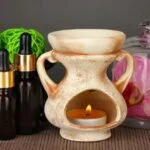In today’s wellness market, the use of aromatherapy oils has gained significant popularity as individuals seek natural and holistic methods to enhance their well-being. Aromatherapy oils have become a go-to option for promoting relaxation, reducing stress, and improving overall mental and physical health.
But can you put aromatherapy oils in the bath? In this article, we will explore the benefits of incorporating aromatherapy oils into your bath routine and how they can elevate your bathing experience to a new level of relaxation and revitalization.
Aromatherapy oils, also known as essential oils, are highly concentrated plant extracts that capture the therapeutic properties of various botanicals. These oils have long been used in traditional medicine practices for their ability to promote emotional well-being, relieve stress and anxiety, improve sleep quality, and even alleviate physical discomfort. Today, they have found their place in modern wellness rituals as more people recognize the unique benefits they bring to their everyday lives.
Not only are aromatherapy oils widely recognized for their aromatic qualities that promote a soothing atmosphere, but they also possess chemical components that can positively impact our limbic system – the part of our brain responsible for emotions and memories. By inhaling or absorbing these oils through our skin during a bath, we allow these therapeutic compounds to enter our bloodstream and interact with our body on a cellular level.
This direct pathway enhances their effectiveness in supporting various aspects of our well-being.
So if you’ve ever wondered whether you can put aromatherapy oils in the bath, wonder no more. With their increasing popularity and proven benefits, incorporating these precious botanical extracts into your bathing routine may just be the self-care practice you need to refresh your mind, relax your body, and rejuvenate your soul.
What Are Aromatherapy Oils?
Aromatherapy oils, also known as essential oils, are highly concentrated plant extracts that have been utilized for centuries to enhance mood and promote relaxation. These oils are derived from various parts of plants such as flowers, leaves, stems, and roots, and each oil possesses its own unique therapeutic properties. Aromatherapy oils have gained significant popularity in today’s wellness market due to their natural and holistic approach to improving overall well-being.
The uses of aromatherapy oils are vast and varied. They can be diffused into the air, applied topically to the skin, or even ingested in some cases. However, one of the most enjoyable ways to experience the benefits of aromatherapy oils is by incorporating them into a warm bath.
When added to bathwater, aromatherapy oils disperse throughout the water and release their fragrance. As you soak in the bath, your skin absorbs these tiny oil droplets along with their therapeutic compounds. This allows for a direct entry into your bloodstream, resulting in both physical and emotional benefits.
The effects of aromatherapy oils can vary depending on the specific oil used. For example, lavender oil is well-known for its calming properties and is often used to reduce anxiety and improve sleep quality. On the other hand, citrus oils like lemon or orange can help uplift your mood and provide an energy boost. Eucalyptus oil is commonly used for congestion relief, while chamomile oil is prized for its soothing effects on irritated skin.
Exploring the Science Behind Aromatherapy
Aromatherapy has gained significant popularity in the wellness market today, with many people turning to essential oils for their therapeutic benefits. But how exactly do aromatherapy oils work? In this section, we will delve into the science behind aromatherapy and explore the underlying principles and mechanisms of how aromatherapy oils work their magic.
At the core of aromatherapy is the belief that certain scents have the ability to trigger emotional and physiological responses in the body. When inhaling a particular aroma, it can stimulate the olfactory system, which is connected to the part of our brain that controls emotions and long-term memory. This connection between smell and emotion is why certain scents can have a profound effect on our mood, stress levels, and overall well-being.
Additionally, aromatic molecules from essential oils can also be absorbed through our skin. When applied topically or added to a bath, these molecules are able to penetrate the skin barrier and enter the bloodstream. From there, they can interact with different systems in our body, such as the nervous system or immune system, and produce various therapeutic effects.
To understand how different essential oils produce specific effects on our body and mind, it’s important to consider their chemical composition. Each essential oil contains a unique combination of chemical compounds that contribute to its distinct aroma and therapeutic properties. For example, lavender oil has calming properties due to its high concentration of linalool, while citrus oils like lemon or orange contain uplifting compounds such as limonene.
| Benefits | Data |
|---|---|
| Stress reduction | A study published in the Journal of Alternative and Complementary Medicine found that inhaling lavender essential oil significantly reduced stress levels in participants. |
| Pain relief | Certain essential oils like eucalyptus or peppermint have been found to have analgesic properties, providing relief from pain when applied topically. |
| Mood enhancement | Inhaling citrus oils like grapefruit or bergamot has been shown to improve mood and increase feelings of happiness. A study conducted in Japan found that the scent of lemon essential oil elevated mood and lowered stress levels in office workers. |
Types of Aromatherapy Oils for the Bath
Aromatherapy oils have gained significant popularity in the wellness market today due to their numerous benefits. They are widely used to enhance mood, relieve stress, and promote relaxation. One of the most common ways to use aromatherapy oils is by incorporating them into a bath, providing a soothing and therapeutic experience. There are various types of essential oils that are commonly used for bath aromatherapy, each offering unique benefits.
Lavender oil is perhaps one of the most popular essential oils used in bath aromatherapy. It is well-known for its calming and relaxing properties, making it ideal for those who want to unwind after a long day. Lavender oil can also help improve sleep quality, alleviate headaches, and reduce anxiety.
Another commonly used essential oil for the bath is eucalyptus oil. This oil has a refreshing and invigorating scent that can help clear the sinuses and relieve congestion. It is often used during cold and flu season or whenever you need a little extra respiratory support.
Peppermint oil is another favorite for bath aromatherapy due to its cooling and uplifting effects. It can provide relief from muscle aches and pains, as well as headaches. Peppermint oil can also help improve focus and concentration, making it an excellent choice for those who need an energy boost.
| Essential Oil | Benefits |
|---|---|
| Lavender | Calming, relaxing, improves sleep quality |
| Eucalyptus | Clears sinuses, relieves congestion |
| Peppermint | Cooling, uplifting, relieves muscle aches, improves focus |
These are just a few examples of the many essential oils that can be used in bath aromatherapy. It’s important to note that when using essential oils in the bath, it is crucial to properly dilute them in a carrier oil or an emulsifier to prevent skin irritation. Additionally, always follow the recommended dosage and duration of use for each essential oil to ensure a safe and enjoyable experience.
Safety Guidelines and Precautions
Aromatherapy oils can be a wonderful addition to your bath routine, but it’s important to follow safety guidelines and precautions to ensure a safe and enjoyable experience. Proper dilution, usage, and understanding contraindications are essential when incorporating aromatherapy oils into your bathing routine.
Dilution
One of the most important aspects of using aromatherapy oils in the bath is proper dilution. Essential oils are highly concentrated and should never be applied directly to the skin or added undiluted to your bathwater. It is recommended to dilute essential oils with a carrier oil, such as jojoba oil or sweet almond oil, before adding them to your bath. A general guideline for dilution is about 5-10 drops of essential oil per 1 ounce of carrier oil.
Usage
When using aromatherapy oils in the bath, it’s best to add them after you have filled the tub with warm water. This allows the oils to disperse more evenly throughout the water. Stir the water gently before getting into the bath to ensure that the oils are well mixed.
Contraindications
While aromatherapy can provide various benefits, it’s important to be aware of any contraindications or possible sensitivities before using essential oils in your bath. Some essential oils may cause irritation or allergic reactions in certain individuals.
Additionally, certain medical conditions or medications may interact negatively with specific essential oils. It is always recommended to do a patch test on a small area of skin before using an essential oil in your bath and consult with a healthcare professional if you have any concerns or questions regarding contraindications.
By following these safety guidelines and precautions, you can enjoy the many benefits that aromatherapy oils can provide while ensuring a safe and enjoyable bathing experience. Remember that everyone’s body is unique, so it’s important to listen to your own body and adjust your usage of essential oils accordingly. With proper care and consideration, incorporating aromatherapy oils into your bath routine can enhance relaxation and provide a soothing experience for both the mind and body.
How to Use Aromatherapy Oils in the Bath
Using aromatherapy oils in the bath can be a wonderful way to relax and unwind after a long day. The combination of warm water and soothing scents can create a deeply calming and therapeutic experience. To maximize the benefits of aromatherapy oils in the bath, it’s important to know how to use them properly. Here is a step-by-step guide on preparing an aromatherapy bath and some soaking techniques for maximum relaxation:
1. Choose the Right Essential Oil: Start by selecting an essential oil that suits your needs and preferences. Different oils have different properties, so consider what you want to achieve from your bath. For example, lavender oil is known for its calming effects, while eucalyptus oil can help clear congestion and promote deep breathing.
2. Dilute the Essential Oil: Essential oils are highly concentrated, so it’s important to dilute them before using in the bath. Mix a few drops of your chosen oil with a carrier oil such as almond oil or jojoba oil. The general guideline is to use around 5-10 drops of essential oil per tablespoon of carrier oil.
3. Prepare Your Bath: Fill your bathtub with warm water at a temperature that is comfortable for you. As the tub fills, add your diluted essential oil mixture to the water and agitate it gently to disperse the aroma throughout.
4. Relax and Soak: Once your bath is ready, immerse yourself in the water slowly and allow yourself to fully relax. Take slow deep breaths, inhaling the scent of the essential oils as you soak. You can enhance your experience by adding other elements like candles, soft music or even a book.
5. Soaking Techniques: While soaking in an aromatherapy bath, there are various techniques you can try to further enhance relaxation:
– Deep Breathing Exercises: Take deep breaths in through your nose and exhale slowly through your mouth. Focus on the scent of the essential oils and let it calm your mind and body.
– Meditation or Mindfulness: Use this time to practice mindfulness or meditation. Close your eyes, focus on your breathing, and let go of any thoughts or worries that may arise.
– Gentle Stretching or Yoga: If you feel up to it, you can incorporate gentle stretching or yoga poses while soaking in the bath. This can help release tension from your muscles and enhance relaxation.
By following these step-by-step instructions and incorporating soaking techniques for relaxation, you can create a truly blissful aromatherapy bath experience. Remember to always prioritize safety by properly diluting the oils and being mindful of any potential allergies or sensitivities. Enjoy the benefits of aromatic relaxation and make bath time a rejuvenating self-care ritual.
Benefits of Using Aromatherapy Oils in the Bath
Using aromatherapy oils in the bath can offer a multitude of physical and mental benefits, making it an excellent addition to your self-care routine. The combination of warm water and essential oils creates a luxurious bathing experience that can promote relaxation, improve mood, and provide relief from stress and fatigue.
One of the key benefits of incorporating aromatherapy oils into your bath is its ability to promote relaxation and reduce anxiety. Essential oils such as lavender, chamomile, and rose have calming properties that can help ease tension and induce a state of tranquility. As you soak in the aromatic bath, the scent of these oils triggers receptors in your brain, releasing chemicals that soothe your nervous system and promote feelings of relaxation.
In addition to promoting relaxation, using aromatherapy oils in the bath can also enhance your mood and uplift your spirits. Certain essential oils like bergamot, citrus fruits, and ylang-ylang have uplifting properties that can boost your mood and help alleviate symptoms of depression or low energy levels. The pleasant fragrance released by these oils during your bath can stimulate neurotransmitters in your brain associated with happiness and well-being.
Moreover, incorporating aromatherapy oils into bath time rituals can provide various physical benefits as well. Some essential oils, such as eucalyptus or peppermint, have decongestant properties that can help clear sinuses and relieve respiratory issues. Other oils like tea tree oil or lavender can have antibacterial or anti-inflammatory effects on the skin when used topically in the bathwater.
Overall, using aromatherapy oils in the bath is a simple yet effective way to incorporate self-care into your daily routine. The combination of soothing scents, warm water, and powerful botanical properties provides a holistic experience for both mind and body. Whether you are seeking relaxation after a stressful day or looking for natural remedies to support specific health concerns, incorporating aromatherapy oils into your baths can offer a range of benefits that contribute to your overall well-being.
Conclusion
In conclusion, aromatherapy oils can be a wonderful addition to your bath routine, providing numerous benefits for both your physical and mental well-being. By understanding the science behind aromatherapy and the different types of essential oils available, you can create a personalized bath experience that suits your needs.
First and foremost, safety should always be a priority when using aromatherapy oils in the bath. Proper dilution and usage guidelines should be followed to prevent any adverse reactions or irritation. It is also important to note any contraindications or allergies you may have before incorporating these oils into your routine.
Once you have taken the necessary precautions, using aromatherapy oils in the bath can offer a multitude of benefits. From relieving stress and enhancing mood to promoting relaxation and improving sleep quality, these oils have the power to transform your bath into a soothing sanctuary where you can escape from the pressures of daily life.
Frequently Asked Questions
What Essential Oils Should You Not Put in the Bath?
When it comes to the bath, there are certain essential oils that you should avoid using. It’s important to note that not all essential oils are safe to use in water. Some essential oils can cause skin irritation, allergic reactions, or even chemical burns when directly applied to the skin without being diluted first.
Therefore, it is generally recommended to avoid putting strong or irritating essential oils in the bath. Examples of oils to avoid include cinnamon, clove, oregano, and thyme oil. It is always best to consult with a qualified aromatherapist or conduct thorough research before adding any essential oils to your bath.
Can You Mix Aromatherapy Oils With Water?
Aromatherapy oils can be mixed with water but caution must be exercised. Ideally, before using any essential oil in water, it should be properly diluted with a suitable carrier oil or emulsifier. This helps ensure that the oil is dispersed more evenly in the water and reduces the risk of skin irritation or allergic reactions caused by undiluted contact with the oil.
However, it’s important to note that not all essential oils are soluble in water alone and may require solvents or emulsifiers for proper dispersion. Additionally, some essential oils may not mix well with water due to their composition or specific properties, so it’s always best to research and follow proper dilution guidelines provided by reputable sources.
Can You Put Aromatherapy Oils in a Hot Tub?
Putting aromatherapy oils directly into a hot tub is generally not recommended as the high temperature of the hot tub can alter their properties and potentially cause adverse reactions on the skin. Hot tubs usually have powerful jets and circulation systems which can agitate and disperse the volatile compounds present in essential oils more rapidly than intended, resulting in stronger concentrations than desired. This increased concentration can lead to skin irritation or sensitization for some individuals.
Instead of putting aromatherapy oils directly into a hot tub, it is advisable to use alternative methods such as diffusers specifically designed for hot tubs or adding the oils to a carrier oil or bath salt blend before adding it to the water. These methods can help ensure safer and more controlled distribution of aromatherapy oils in a hot tub.

Are you looking for a natural way to improve your health and wellbeing?
If so, aromatherapy may be the answer for you.





